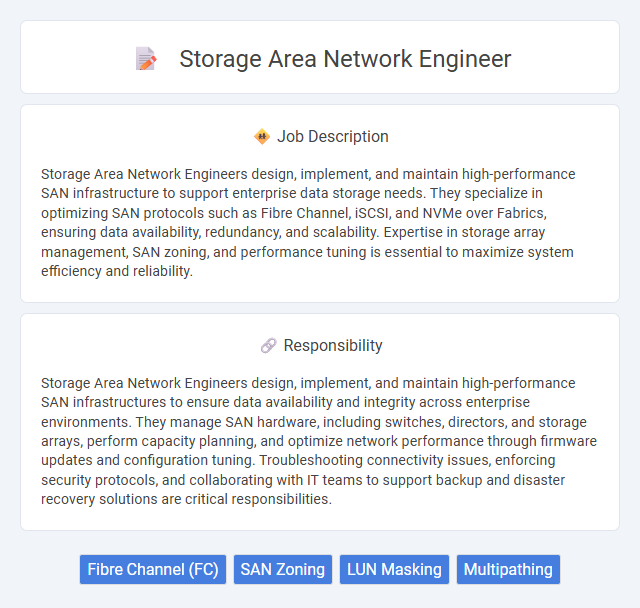
Storage Area Network Engineers design, implement, and maintain high-performance SAN infrastructure to support enterprise data storage needs. They specialize in optimizing SAN protocols such as Fibre Channel, iSCSI, and NVMe over Fabrics, ensuring data availability, redundancy, and scalability. Expertise in storage array management, SAN zoning, and performance tuning is essential to maximize system efficiency and reliability.
Individuals with strong analytical skills and a passion for complex technology systems are likely well-suited for a Storage Area Network Engineer role. Those who thrive in dynamic environments, possess attention to detail, and enjoy troubleshooting network infrastructure may find the job fulfilling. People who prefer routine tasks or have limited interest in continuous learning about network advancements might face challenges in adapting to this position.
Qualification
Storage Area Network (SAN) Engineers must possess in-depth knowledge of SAN architectures, including Fibre Channel, iSCSI protocols, and SAN switching technologies. Proficiency in configuring and managing storage arrays from leading vendors such as EMC, NetApp, or Dell is essential, alongside experience with SAN zoning, LUN masking, and performance tuning. Certifications like Cisco CCNP Data Center, VMware VCAP, or vendor-specific storage credentials enhance a candidate's technical credibility and demonstrate expertise in enterprise storage solutions.
Responsibility
Storage Area Network Engineers design, implement, and maintain high-performance SAN infrastructures to ensure data availability and integrity across enterprise environments. They manage SAN hardware, including switches, directors, and storage arrays, perform capacity planning, and optimize network performance through firmware updates and configuration tuning. Troubleshooting connectivity issues, enforcing security protocols, and collaborating with IT teams to support backup and disaster recovery solutions are critical responsibilities.
Benefit
A Storage Area Network (SAN) Engineer likely enjoys substantial benefits including enhanced career growth opportunities due to the high demand for specialized skills in data storage management. They probably receive competitive salaries and comprehensive benefits packages reflecting the critical nature of their role in ensuring data availability and network efficiency. Certification and ongoing training opportunities may also be common, contributing to long-term professional development and job security.
Challenge
Storage Area Network Engineers probably encounter complex challenges involving the design, implementation, and troubleshooting of high-performance SAN environments. Managing the integration of evolving storage technologies and ensuring data availability, scalability, and security likely demand advanced problem-solving skills. The role may frequently require adapting to rapid technological changes and coordinating with cross-functional teams to mitigate downtime and optimize system efficiency.
Career Advancement
A Storage Area Network (SAN) Engineer specializes in designing, implementing, and managing high-performance storage networks that connect servers and storage devices to optimize data accessibility. Mastery of SAN technologies such as Fibre Channel, iSCSI, and storage virtualization positions professionals for roles like Senior SAN Engineer, Storage Architect, or IT Infrastructure Manager. Pursuing certifications like Cisco CCNP Data Center or VMware VCAP enhances career advancement opportunities within enterprise IT and cloud computing environments.
Key Terms
Fibre Channel (FC)
A Storage Area Network (SAN) Engineer specializing in Fibre Channel (FC) technology designs, implements, and maintains high-performance FC SAN architectures to ensure efficient and reliable data storage connectivity. Expertise in FC protocols, zoning configurations, and switch management is essential for optimizing data throughput and minimizing latency in enterprise environments. Proficiency with vendors like Cisco, Brocade, and Dell EMC SAN switches enhances the ability to troubleshoot complex storage network issues and maintain uninterrupted data access.
SAN Zoning
A Storage Area Network (SAN) Engineer specializes in managing and optimizing SAN zoning to ensure data security, efficient traffic flow, and resource allocation across networked storage devices. Expert knowledge of Fibre Channel protocols, zoning configurations, and switch management is essential for preventing unauthorized access and minimizing downtime. Proficiency in tools such as Cisco MDS, Brocade switches, and SAN management software enables precise zoning configurations that enhance overall data center performance.
LUN Masking
A Storage Area Network (SAN) Engineer specializing in LUN Masking configures and manages logical unit number (LUN) access controls to ensure data security and optimize storage resources. They implement masking techniques to restrict device visibility, preventing unauthorized server access to specific storage volumes and maintaining data integrity. Expertise in SAN protocols like Fibre Channel and iSCSI enables precise allocation and protection of LUNs within complex storage environments.
Multipathing
A Storage Area Network (SAN) Engineer specializing in multipathing ensures high availability and optimal performance of storage systems by managing multiple data paths between servers and storage devices. Expertise in configuring and troubleshooting multipathing software such as Microsoft MPIO, EMC PowerPath, or Dell EqualLogic DSM enables seamless failover and load balancing. Proficiency in SAN protocols including Fibre Channel, iSCSI, and FCoE is critical for implementing resilient storage environments and minimizing downtime.
 kuljobs.com
kuljobs.com